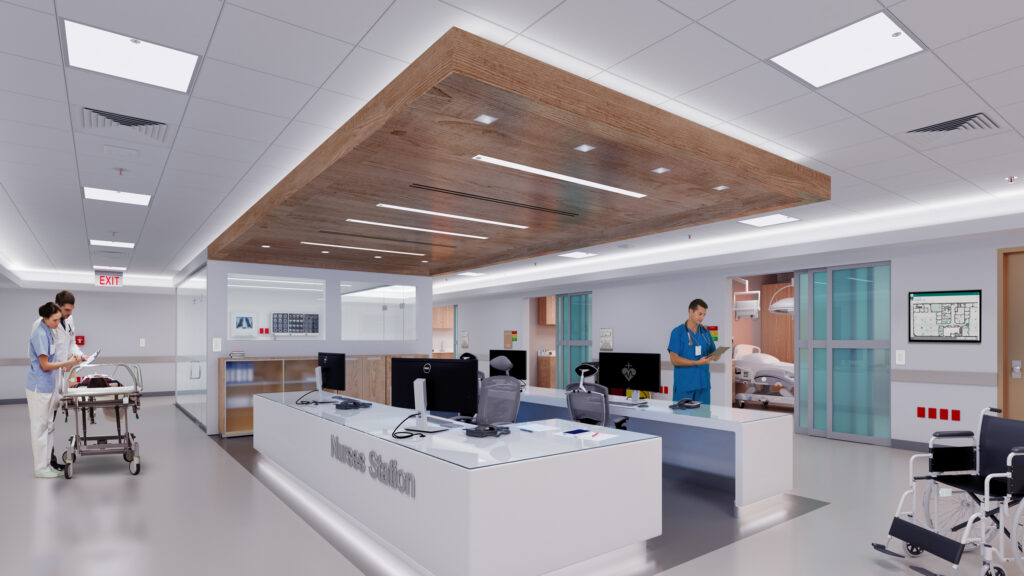Hospitals are among the most energy-consuming commercial buildings in the U.S. They’re ‘always on,’ as patients need continuous care and comfort throughout their hospital stays.
This creates challenging circumstances regarding reducing energy consumption, but it’s not impossible. There are tons of great ways to minimize energy waste throughout medical facilities, and we’re highlighting some of the most effective energy saving strategies in this blog.
Why Reduce Energy Consumption in Hospitals?
Beyond reducing the environmental impact of healthcare facilities, there are lots of other valuable benefits to cutting consumption — from lower bills to better patient care. Let’s start on the operational side, discovering how increasing energy efficiency can impact the health system from an economic standpoint:
Lower Energy Bills
Hospitals consume vast amounts of energy — about 426.9 kBtu/ft2 according to Energy Star. Reducing waste through more efficient lighting, HVAC systems and energy-saving medical equipment can help reduce electricity usage across the board and lead to significant energy savings.
Reduced Operational Costs
With an eye toward efficiency and reducing the amount of power particular pieces of equipment consume, hospitals could extend the life of expensive infrastructure as costly repairs and replacements hopefully become less frequent.
Take traditional fluorescent light bulbs, for example, which last up to about 36,000 hours. LEDs, on the other hand, last much longer at around 50,000 hours. Add smart lighting solutions on top, such as motion-activated switches, and hospitals can further reduce operational expenses.
Heightened Emergency Readiness
Energy-efficient systems often include backup power solutions, such as utilizing renewables like solar energy. When hospitals have other means of energy to rely on, emergencies such as extended power outages become less detrimental to daily operations.
Benefits for Patients/Staff
The business side of the healthcare sector isn’t the only part that stands to benefit from increased energy efficiency. Staff and patients spend long, hard hours in medical facilities, so increasing comfort is a must — and becoming more energy efficient can help with that:
Better Indoor Air Quality
Improved HVAC systems not only reduce energy use but also provide better ventilation, air filtration and control, which can lead to higher indoor air quality. One study even found that “Bacterial and fungal bioaerosol concentrations were generally higher in naturally ventilated rooms compared with the degerming effect of central air-conditioned systems, which are proven to be effective in removing airborne microbes.”
So, high-tech, efficient HVAC solutions not only help hospitals save money but actually contribute to cleaner, healthier air for staff and patients to breathe.
Optimal Comfort
Those same high-tech, energy-efficient climate control systems can help maintain consistent and comfortable temperatures for patients. In an environment where comfort is paramount, maintaining optimal temperatures may help reduce stress and promote healing throughout patients’ stays.
For staff, indoor air temperatures that are too high or too low can easily lead to discomfort, which may impact their ability to provide high-quality patient care.

Strategies for Increasing Energy Efficiency in Hospitals
Optimizing energy consumption and improving energy efficiency in hospitals requires a multifaceted and strategic approach, ranging from equipment upgrades to adopting energy management technology — but it’s essential to start with an audit.
Conduct an Energy Audit
Partnering with energy procurement experts to complete a thorough energy audit is a great first step toward efficiency. Experts can analyze a hospital’s energy consumption patterns to determine the most valuable energy efficiency improvements across the hospital facility. Here’s how the process typically unfolds:
- Initial assessment: Auditors collect basic data, such as utility bills (electricity, gas, water) to assess energy patterns and determine if there are any anomalies or trends that need further investigation.
- On-site inspection: The auditor conducts a visual inspection of the facility or building to get an understanding of its operations, layout, and energy systems in place (HVAC, lighting, insulation, etc.).
- Data analysis: The auditor calculates the total energy usage and breaks it down into categories (lighting, heating/cooling, equipment, etc.) to pinpoint where inefficiencies exist.
- Recommendations: From quick wins to major equipment upgrades and even operational changes, auditors will suggest options that stand to make the largest impact across the healthcare facility.
- Implementation: Some energy auditors may offer guidance on implementing recommended measures to help find contractors, secure funding, or apply for rebates and incentives.
Renewable Energy Sources and Rebates
Renewable energy is more accessible than ever, and options like solar energy are becoming increasingly affordable. There are plenty of government programs, incentives, and rebates out there that hospitals may qualify for when adopting energy efficient technology. This can help offset upfront costs while making significant green upgrades facility-wide.
Leveraging Utility Management Technology
Once your new systems are in place following the audit, energy management technology is the best way to keep up.
Hospitals are complex environments with high energy demands, operating 24/7 with critical systems. Effective energy management software acts as a window into a facility’s energy usage to more easily track, monitor, and analyze usage in real-time. And, the best systems even offer automation controls for items like invoice management to help reduce administrative burdens on the core facility manager so they can focus more on operational responsibilities.
An Energy Partner You Can Trust
EnerConnex is your trusted partner for all things energy. For a comprehensive energy audit of your healthcare facility or more information on our leading utility management platform, ECX Marketplace, contact us. Also, be sure to explore our Energy Efficiency Solutions to learn more about how EnerConnex can help you take control of your facility through HVAC upgrades, electrification, energy bill auditing, and more.


